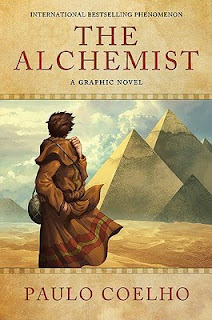 There are many things that annoy me -- I'm sure we all have our lists -- but near the top is when the people who actually do the work don't get the credit. For example, let's take this book here. There is a novel called The Alchemist, which was written by Paulo Coehlo. It's somewhat popular, having sold millions of copies around the world in dozens of languages over the past decade or two. It's kind of a big deal.
There are many things that annoy me -- I'm sure we all have our lists -- but near the top is when the people who actually do the work don't get the credit. For example, let's take this book here. There is a novel called The Alchemist, which was written by Paulo Coehlo. It's somewhat popular, having sold millions of copies around the world in dozens of languages over the past decade or two. It's kind of a big deal.But the book I have here -- despite having "Paulo Coleho" and "The Alchemist" on it in big letters -- is not that novel, as the discreet "A Graphic Novel" is meant to indicate. This is a graphic novel based on that Coelho novel, and, though it says he "reviewed" it, he didn't actually either write the script or draw the pictures, the two most important things that go into creating a graphic novel. [1] This particular rendering of The Alchemist
I'm pretty sure Ruiz and Sampere wouldn't care that I'm annoyed on their behalf, but it's not entirely about them -- consumer packaging should be clear about the contents of a package, and having
The Alchemiston a book actually by Derek Ruiz and Daniel Sampere is just as misleading as "90% fat-free." I may not be able to affect anything, but I can certainly complain whenever I see misleading packaging.
A Graphic Novel
Paulo Coelho
But what about the book itself? Well, it's OK. I haven't read the originalThe Alchemist, but I'm very familiar with the genre -- this is yet another "the world secretly wants you to be happy and so follow your true path, everything will turn out just fine" books. This one is fiction, but I'm sure you all can think of your favorite fictional examples (all of those "affirmations" books, various evangelical "gospel of wealth stuff , The Celestine Prophecy, and so on).
In this particular case, the Andalusian shepherd boy Santiago quit his studies to become a priest because he wanted to travel -- and, I suppose, tromping around the same hillsides with a flock of sheep qualified, and rising in the ranks of the Catholic Church to someday travel regularly to Rome and elsewhere would not -- but, one day, runs into a guy who calls himself the King of Salem [3], who gives him a woo-woo story and sends him off to see the Pyramids.
Santiago is the usual friendly, open-hearted, malleable young lump of clay hero of stories like this, so he sets off on a journey signposted by people Coelho doesn't bother to give names to (the Merchant, the Thief, the Other Merchant, the General, the Leader of the Oasis, the English Man, and the titular Alchemist), who each teach Santiago a little something, then swat his butt and set him off to the next person. In the end, Santiago achieves...well, not enlightenment, which is what I was expecting, but a big chest full of jewels and money. (Which is, in our fallen world, vastly more important.)
The whole thing is all very nice and nonthreatening and nondenominational -- Coelho carefully has really really nice Christians and Muslims, so as not to offend anyone -- and teaches the kind of lesson that everyone deeply wants to believe, namely that if you are friendly and nice and follow your dreams, you'll find that there's a big pot of money you can take somewhere really convenient to your own wheelbarrow. It's a sweet and naive vision of the world, of the kind that's eternally popular.
Turning that story into a graphic novel makes it that much easier to read and fills the pages with pretty pictures. I generally don't equate comics with lower reading levels, but The Alchemist is all but begging me to do so. It's exactly the sort of thing that I'd expect to be a massive international bestseller: a fine example of pandering to a common wish of all humanity. The words are all pleasant, and the pictures all look very nice, but the story is no better than it should be.
[1] And I suspect that one, and possibly several people at Coelho's original publisher "reviewed" the Alchemist novel before it was originally published, and I further suspect that he'd have been quite annoyed himself if one of their names was on the cover instead of his.
[2] Here called a Personal Legend.
[3] Yes, yes. It's always funny when someone else appropriates a bit of your cultural heritage in a ham-handed way. I only wish they did it more often.
Book-A-Day 2010: The Epic Index
No comments:
Post a Comment